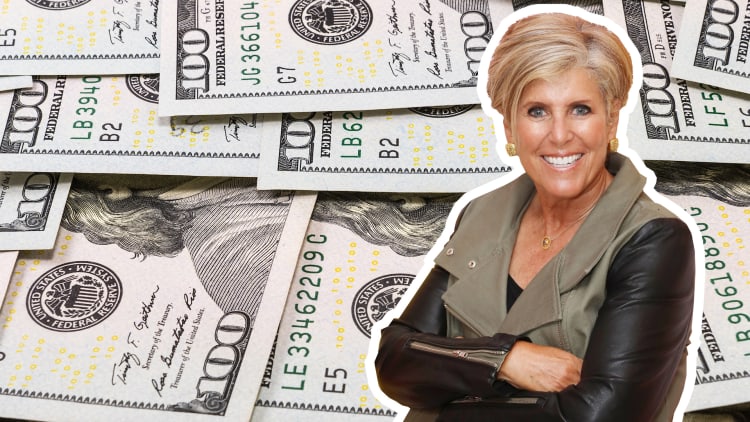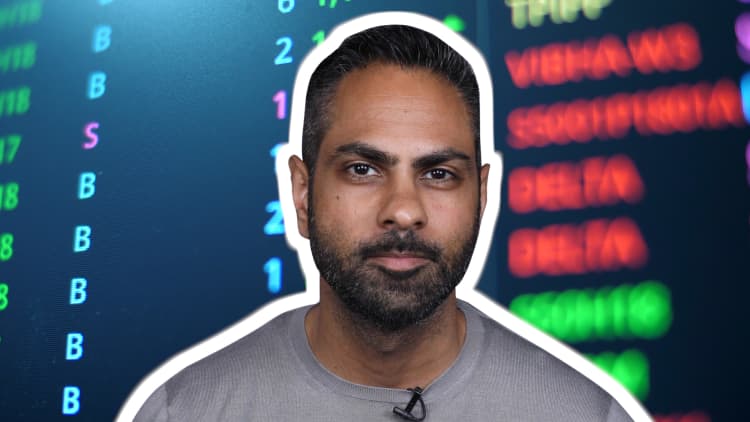If you can't define a 401(k) plan, you're not alone: Though it's one of the most common retirement savings vehicles, 63 percent of Americans don't understand exactly how it works.
That's according to ValuePenguin, which asked 2,000 Americans if they could define key money terms like compound interest, credit score and 401(k), and then shared the results with CNBC Make It. When asked if they understood how a 401(k) plan works, only 37 percent of survey respondents answered yes.
That confusion can have repercussions for your future. After all, some experts say that not taking full advantage of your 401(k), if you have one, is one of the biggest mistakes people make when it comes to retirement planning.
What is a 401(k)?
A 401(k) is a tax-advantaged, employer-sponsored retirement plan that allows you to set aside money from your paycheck for long-term saving and investing. The idea is that, over time, your money will grow and compound until you can start withdrawing it at age 59½. If you withdraw before then, you usually have to pay a penalty.
It's a particularly effective vehicle for a few reasons:
- It offers significant tax advantages: Contributions are made pre-tax so, the more you put in, the more you reduce your taxable income.
- The money is automatically taken from your paycheck before you have the chance to spend it. That makes it a painless way to save for the future.
- Often, companies offer a 401(k) match, which is essentially free money.
Once you enroll in your 401(k) plan, you decide how much you want to contribute and, within certain parameters, how you want to invest.
Carrie Schwab-Pomerantz, financial adviser and president of the Charles Schwab Foundation, tells CNBC Make It that it's crucial for younger savers to be at least partly invested in a diversified equities portfolio: "You hear a lot about people being fearful of risk and being involved in the stock market. But when you under-represent equities, it's just as much risk."
Keep in mind that your 401(k) money will be invested for decades, says Schwab-Pomerantz, and safer but lower-interest investments like bonds may not grow the way you need them to.

Another investment option you may have is a target-date fund, which personal finance expert Ramit Sethi recommends. It's a simple, low-cost option that does the balancing for you depending on the year you expect to retire.
"The computer knows how old you are; it knows roughly when you're going to retire — let's say 65 [years old] — and then it creates a nice portfolio for you," Sethi explains. Think of a target-date fund as "a pie chart," he says: Some of your invested money goes into stocks and equities, some goes to fixed income investments like bonds and some remains in cash.
"I love these funds for a few reasons," he continues. "No. 1, they are simple. You don't need to pick stocks." Plus, they're "low cost," he says. "It's a great investment, a great way to get started" saving for retirement.
How much money can I contribute?
The contribution limit for 401(k) plans in 2019 is $19,000 for workers under age 50 and $25,000 for people age 50 or older. That's much higher than the limits on IRAs (individual retirement accounts), which allow you to contribute up to $6,000 a year in 2019, or $7,000 if you're 50 or older.
"401(k)'s are especially great if they have a match," certified financial planner at Betterment Nick Holeman tells CNBC Make It. "That's something that you won't be able to get from an IRA so, if you have that, take advantage of it."
In that case, your company will match whatever contribution you put towards your 401(k) up to a certain percentage. For example, if you choose to put 4 percent of your salary into your account, your employer will put that same amount in as well, in effect doubling your contribution. And whatever money your company puts in doesn't count towards the IRS contribution limit.
Note that, depending on where you work, the match sometimes comes with stipulations, like you may have to have been at the company for a certain amount of time.
Experts recommend contributing at least enough to get the full employer match. "Otherwise you're walking away from free money," says Schwab-Pomerantz.

While there are many benefits to investing in a 401(k), Holeman does note that, "sometimes 401(k)'s have higher fees," so you'll want to understand those costs upfront. "The fees tend to be higher because there's more compliance paperwork associated with 401(k)'s, like anti-discrimination amongst the company. Whereas if you open up an IRA, it's just your account, so there's less paperwork, which generally means lower fees."
Management and fund fees can add up over time: Paying just 1 percent in fees could cost you nearly $600,000 over 40 years, NerdWallet found. Use tools like FeeX, which will analyze your account and may recommend similar, less costly investment options, to understand just how much you're paying.
What if my company doesn't offer a 401(k)?
If you don't have a 401(k), there are other ways to put your money to work. Consider alternate retirement savings accounts, such as a Roth IRA, traditional IRA, SEP IRA and/or a health savings account.
You can also fund a normal investment account. "There's no rule that says you have to save for retirement in your retirement account," says Holeman.
IRAs "have some nice tax benefits, so that should be where you start," he notes, "but they have some restrictions on them," such as contribution limits and when you can withdraw the money. If you dip into an IRA before age 59 ½ you'll get hit with an early withdrawal fee.
"For someone who wants a little more flexibility or is thinking about retiring early, it might make sense to save money outside of these retirement accounts, in a normal investment account," says Holeman. "You don't get as many tax benefits, but you have a lot more flexibility: There's no age restrictions on pulling the money out and there's no contribution limit."
There's no rule that says you have to save for retirement in your retirement account.Nick Holemancertified financial planner at Betterment
Start by reading up on the best online brokerages. You can also store money in a high-yield savings account or consider robo-advisors. Just be sure to mark these accounts for retirement if that's how you intend to use them.
Most importantly, get going today. And if you don't have the option of investing in a 401(k) plan, don't think of that as a disadvantage. "Having an employer-sponsored retirement plan with a match is nice," Holeman says, but at the same time, you're restricted in a way because "you're stuck with the 401(k) provider that your employer chose."
If you don't have access to a 401(k) plan and have to take matters into your own hands, you have a lot more flexibility: "You can open up an IRA at whatever company you want: Betterment, Vanguard, Charles Schwab, Fidelity, JPMorgan. You can make sure that you pick a company that has the types of investments you're looking for, great tax benefits, a good fee structure, a good user interface and all of those things that are really important."
Don't miss: Most Americans don't understand a money term that can help you save hundreds of thousands of dollars
Like this story? Subscribe to CNBC Make It on YouTube!




